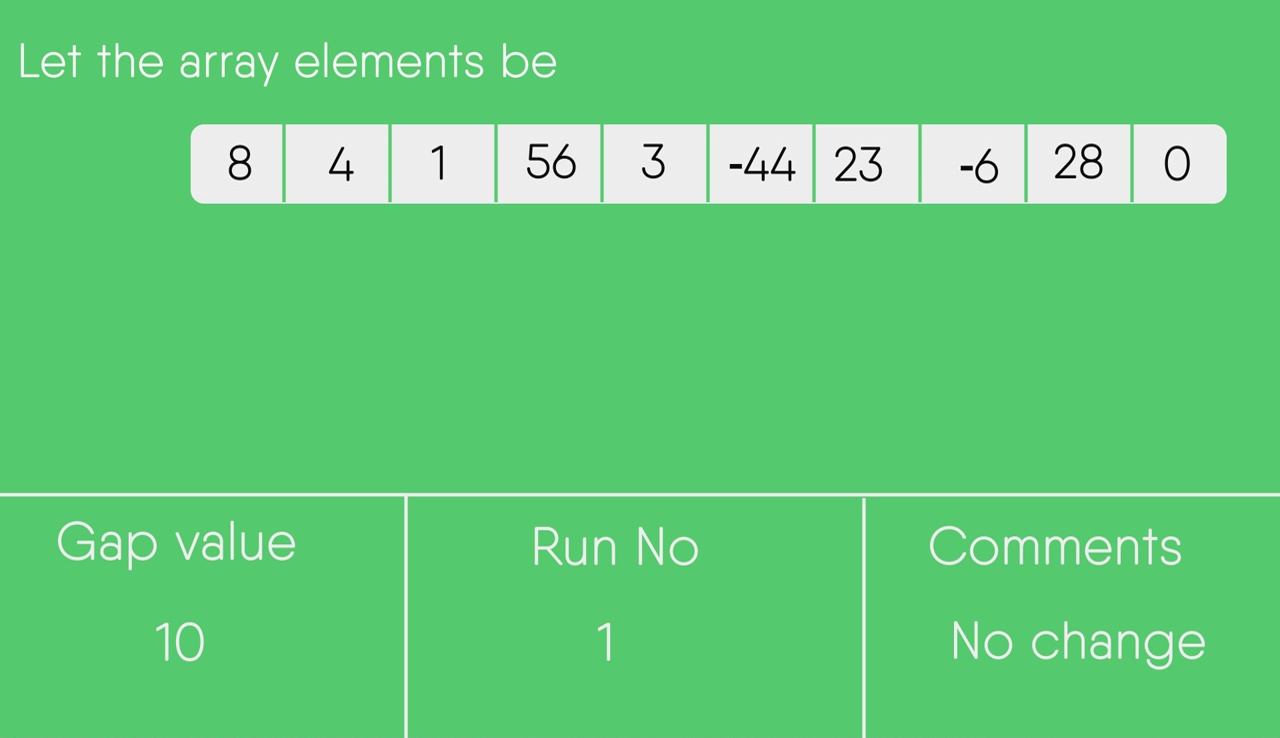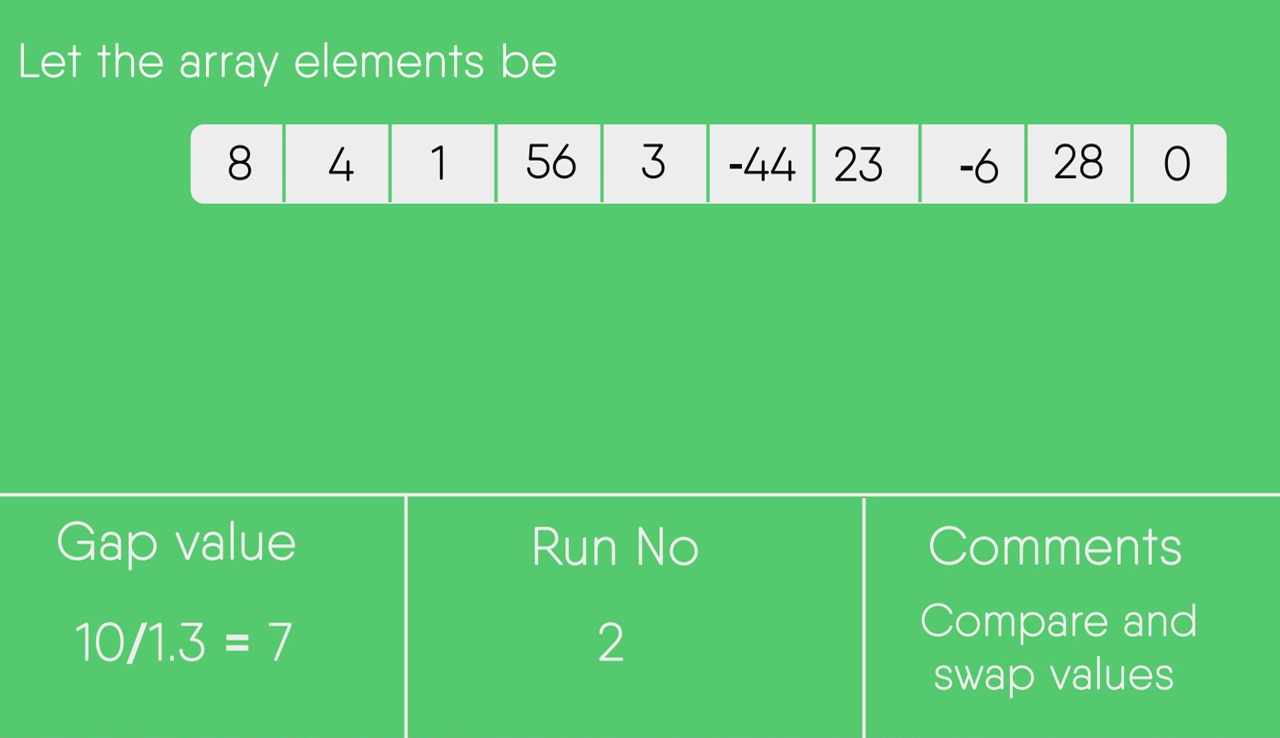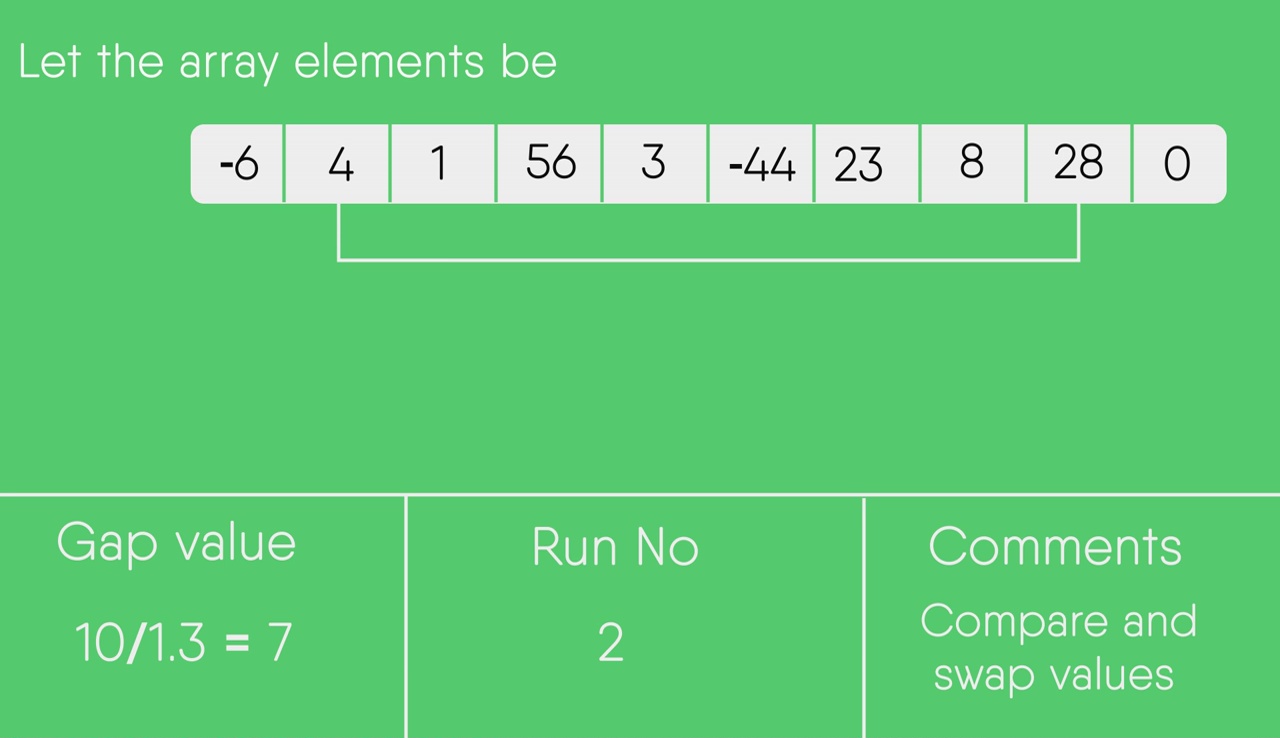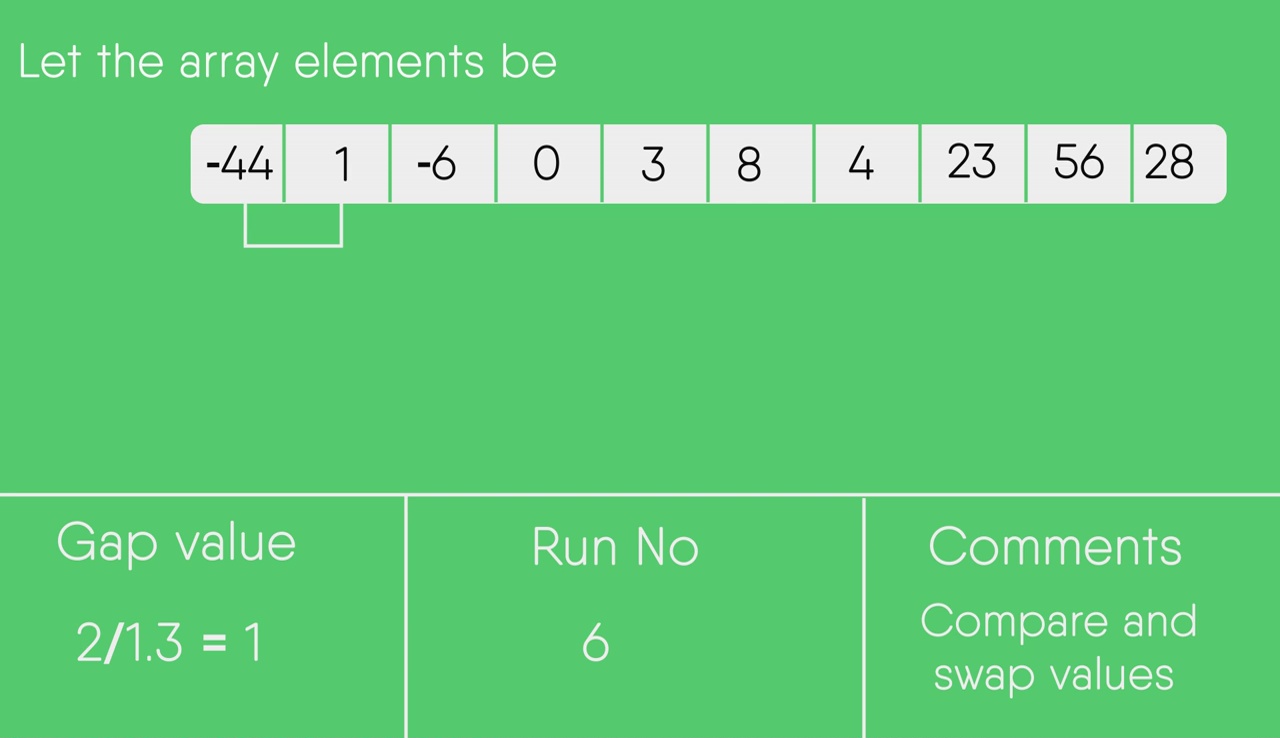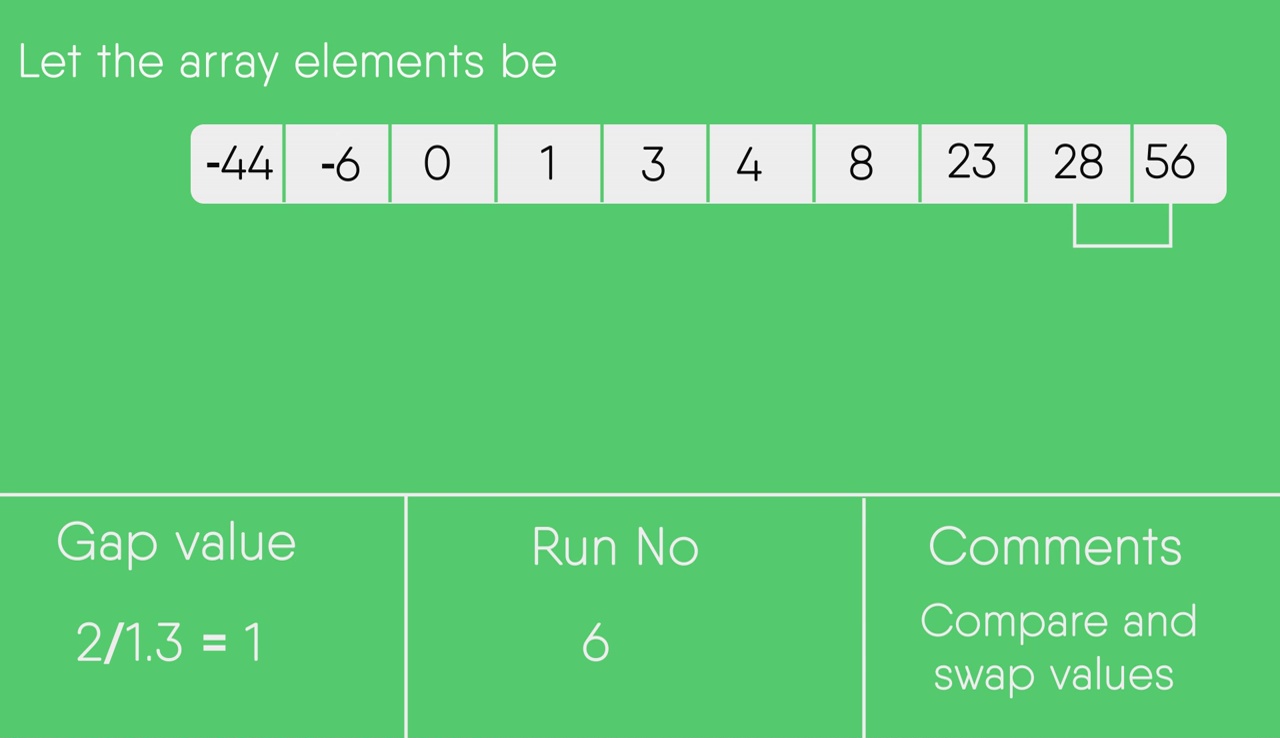梳状排序主要是对冒泡排序的改进。冒泡排序始终会比较相邻的值。因此,所有反演都将一一删除。通过使用大小大于1的间隙,梳状排序在Bubble排序上得到了改进。该间隙以一个较大的值开始,并且在每次迭代中缩小1.3倍,直到达到值1。因此,梳状排序使用一个来消除一个以上的反转计数交换并比气泡排序更好。
根据经验,收缩因子为1.3(通过在200,000多个随机列表上测试Combsort)[来源:Wiki]
尽管它的平均效果优于冒泡排序,但最差的情况仍然是O(n 2 )。
下面是实现。
C++
// C++ implementation of Comb Sort
#include
using namespace std;
// To find gap between elements
int getNextGap(int gap)
{
// Shrink gap by Shrink factor
gap = (gap*10)/13;
if (gap < 1)
return 1;
return gap;
}
// Function to sort a[0..n-1] using Comb Sort
void combSort(int a[], int n)
{
// Initialize gap
int gap = n;
// Initialize swapped as true to make sure that
// loop runs
bool swapped = true;
// Keep running while gap is more than 1 and last
// iteration caused a swap
while (gap != 1 || swapped == true)
{
// Find next gap
gap = getNextGap(gap);
// Initialize swapped as false so that we can
// check if swap happened or not
swapped = false;
// Compare all elements with current gap
for (int i=0; i a[i+gap])
{
swap(a[i], a[i+gap]);
swapped = true;
}
}
}
}
// Driver program
int main()
{
int a[] = {8, 4, 1, 56, 3, -44, 23, -6, 28, 0};
int n = sizeof(a)/sizeof(a[0]);
combSort(a, n);
printf("Sorted array: \n");
for (int i=0; i Java
// Java program for implementation of Comb Sort
class CombSort
{
// To find gap between elements
int getNextGap(int gap)
{
// Shrink gap by Shrink factor
gap = (gap*10)/13;
if (gap < 1)
return 1;
return gap;
}
// Function to sort arr[] using Comb Sort
void sort(int arr[])
{
int n = arr.length;
// initialize gap
int gap = n;
// Initialize swapped as true to make sure that
// loop runs
boolean swapped = true;
// Keep running while gap is more than 1 and last
// iteration caused a swap
while (gap != 1 || swapped == true)
{
// Find next gap
gap = getNextGap(gap);
// Initialize swapped as false so that we can
// check if swap happened or not
swapped = false;
// Compare all elements with current gap
for (int i=0; i arr[i+gap])
{
// Swap arr[i] and arr[i+gap]
int temp = arr[i];
arr[i] = arr[i+gap];
arr[i+gap] = temp;
// Set swapped
swapped = true;
}
}
}
}
// Driver method
public static void main(String args[])
{
CombSort ob = new CombSort();
int arr[] = {8, 4, 1, 56, 3, -44, 23, -6, 28, 0};
ob.sort(arr);
System.out.println("sorted array");
for (int i=0; i Python
# Python program for implementation of CombSort
# To find next gap from current
def getNextGap(gap):
# Shrink gap by Shrink factor
gap = (gap * 10)/13
if gap < 1:
return 1
return gap
# Function to sort arr[] using Comb Sort
def combSort(arr):
n = len(arr)
# Initialize gap
gap = n
# Initialize swapped as true to make sure that
# loop runs
swapped = True
# Keep running while gap is more than 1 and last
# iteration caused a swap
while gap !=1 or swapped == 1:
# Find next gap
gap = getNextGap(gap)
# Initialize swapped as false so that we can
# check if swap happened or not
swapped = False
# Compare all elements with current gap
for i in range(0, n-gap):
if arr[i] > arr[i + gap]:
arr[i], arr[i + gap]=arr[i + gap], arr[i]
swapped = True
# Driver code to test above
arr = [ 8, 4, 1, 3, -44, 23, -6, 28, 0]
combSort(arr)
print ("Sorted array:")
for i in range(len(arr)):
print (arr[i]),
# This code is contributed by Mohit KumraC#
// C# program for implementation of Comb Sort
using System;
class GFG
{
// To find gap between elements
static int getNextGap(int gap)
{
// Shrink gap by Shrink factor
gap = (gap*10)/13;
if (gap < 1)
return 1;
return gap;
}
// Function to sort arr[] using Comb Sort
static void sort(int []arr)
{
int n = arr.Length;
// initialize gap
int gap = n;
// Initialize swapped as true to
// make sure that loop runs
bool swapped = true;
// Keep running while gap is more than
// 1 and last iteration caused a swap
while (gap != 1 || swapped == true)
{
// Find next gap
gap = getNextGap(gap);
// Initialize swapped as false so that we can
// check if swap happened or not
swapped = false;
// Compare all elements with current gap
for (int i=0; i arr[i+gap])
{
// Swap arr[i] and arr[i+gap]
int temp = arr[i];
arr[i] = arr[i+gap];
arr[i+gap] = temp;
// Set swapped
swapped = true;
}
}
}
}
// Driver method
public static void Main()
{
int []arr = {8, 4, 1, 56, 3, -44, 23, -6, 28, 0};
sort(arr);
Console.WriteLine("sorted array");
for (int i=0; i 输出 :
Sorted array:
-44 -6 0 1 3 4 8 23 28 56 插图:
令数组元素为
8, 4, 1, 56, 3, -44, 23, -6, 28, 0初始间隙值= 10
缩小后的间隙值=> 10 / 1.3 = 7 ;
8 4 1 56 3 -44 23 -6 28 0
-6 4 1 56 3 -44 23 8 28 0
-6 4 0 56 3 -44 23 8 28 1新的间隙值=> 7 / 1.3 = 5 ;
-44 4 0 56 3 -6 23 8 28 1
-44 4 0 28 3 -6 23 8 56 1
-44 4 0 28 1 -6 23 8 56 3新的间隙值=> 5 / 1.3 = 3 ;
-44 1 0 28 4 -6 23 8 56 3
-44 1 -6 28 4 0 23 8 56 3
-44 1 -6 23 4 0 28 8 56 3
-44 1 -6 23 4 0 3 8 56 28新的间隙值=> 3 / 1.3 = 2 ;
-44 1 -6 0 4 23 3 8 56 28
-44 1 -6 0 3 23 4 8 56 28
-44 1 -6 0 3 8 4 23 56 28新的间隙值=> 2 / 1.3 = 1 ;
-44 -6 1 0 3 8 4 23 56 28
-44 -6 0 1 3 8 4 23 56 28
-44 -6 0 1 3 4 8 23 56 28
-44 -6 0 1 3 4 8 23 28 56
no more swaps required (Array sorted)时间复杂性:该算法的情况下,平均时间复杂性为Ω(N 2/2×P),其中p为增量的数量。该算法的最坏情况复杂度为O(n 2 ),最佳情况复杂度为O(nlogn)。
辅助空间: O(1)。
梳理测验
快照:
